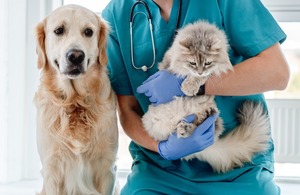The Country’s vets could face a formal market investigation by the competition regulator after an initial review raised multiple concerns about the sector.
The CMA highlighted several areas of concern following a formal review of the sector last September.
They found that Consumers may not be given enough information to enable them to choose the best veterinary practice or the right treatment for their needs and that Concentrated local markets, in part driven by sector consolidation, may be leading to weak competition in some areas.
Since 2013 1,500 of the 5,000 vet practices in the UK have been acquired by the 6 large corporate groups
They found that large corporate groups may have incentives to act in ways which reduce choice and weaken competition and that pet owners might be overpaying for medicines or prescriptions.
Vets must use signs in reception or treatment rooms to tell customers that they can get a prescription for medicine and buy it elsewhere, but the CMA is concerned that these may not be effective. While it can be convenient to buy a medicine directly from the vet as part of a consultation, around 25% of pet owners did not know that getting a prescription filled elsewhere was an option – meaning they are missing out on potential savings, even with the prescription fee.
Meawhile some vet practices may make up to a quarter of their income selling medicines – so there may be little incentive to make pet owners aware of alternatives.
They also said that the regulatory framework is outdated and may no longer be fit for purpose.
Most vet practices do not display prices on their website – of those practices checked, over 80% had no pricing information online, even for the most basic services. Pet owners tend not to shop around between vet practices and assume prices will be similar, although that is not always the case.
People are not always informed of the cost of treatment before agreeing to it – around one fifth of respondents to the CFI said that they were not provided with any cost information before agreeing to tests, around one in 10 said they were not provided with cost information before their pet had surgery, and around half said they were not informed about costs before agreeing to out of hours treatment.
A company can own multiple vet practices in a local area without making that clear – for example, only 4 out of 6 of the largest groups don’t change the name or branding when they take over an independently owned vet practice. This means pet owners are not always comparing competitors when choosing a vet practice.
Sarah Cardell, Chief Executive of the CMA, said:
We launched our review of the veterinary sector last September because this is a critical market for the UK’s 16 million pet owners. The unprecedented response we received from the public and veterinary professionals shows the strength of feeling on this issue is high and why we were right to look into this.
We have heard concerns from those working in the sector about the pressures they face, including acute staff shortages, and the impact this has on individual professionals. But our review has identified multiple concerns with the market that we think should be investigated further.
These include pet owners finding it difficult to access basic information like price lists and prescription costs – and potentially overpaying for medicines. We are also concerned about weak competition in some areas, driven in part by sector consolidation, and the incentives for large corporate groups to act in ways which may reduce competition and choice.
Given these strong indications of potential concern, it is time to put our work on a formal footing. We have provisionally decided to launch a market investigation because that’s the quickest route to enable us to take direct action, if needed.







